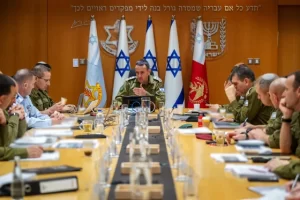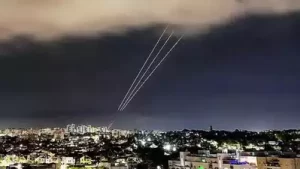The Israeli military reports that they successfully intercepted 99% of the missiles and drones launched by Iran overnight, averting any damage to their targets. Iran has declared this assault as retaliation for a recent deadly attack on an Iranian diplomatic compound in Syria.
The direction of the situation hinges largely on Israel’s response to the latest attack. Despite calls for restraint from various countries in the region and beyond, including those with strong opposition to the Iranian regime, Israel has promised “a significant response.”
Israel considers options after the Iran threat
Iran’s stance suggests that they consider the matter settled, warning against further retaliation, or else they may unleash a more potent assault. The unfolding events underscore the delicate balance and potential volatility in the region, as decisions made by key players will shape the trajectory of future developments.

In swift response to the Hamas-led attacks on southern Israel on October 7, Israel launched a relentless six-month campaign targeting the Gaza Strip. Now, faced with a direct attack from Iran, Israel’s war cabinet stands poised to respond, weighing its options with strategic precision.

One potential avenue is the path of “strategic patience,” heeding the counsel of neighboring nations and refraining from immediate retaliation. Instead, Israel could persist in its ongoing strategy of targeting Iran’s proxy allies across the region, such as Hezbollah in Lebanon or military installations in Syria, a tactic it has employed for years.
Alternatively, Israel may opt for a measured escalation, responding with calculated long-range missile strikes aimed specifically at the bases responsible for the recent attack. While this approach would still be viewed as an escalation by Iran, it would constitute a direct assault on Iranian soil, rather than targeting its proxy forces.
IRGC of Iran is designated as a terrorist organization by the United States
A further escalation could involve broadening the scope of retaliation to include bases, training camps, and command centers belonging to Iran’s formidable Revolutionary Guards Corps (IRGC). Yet, both of these latter options carry the risk of triggering additional retaliation from Iran, potentially spiraling into a wider conflict.

The pivotal question at hand is whether such actions will draw the United States into the fray, potentially igniting a full-scale conflict between Iran and US forces in the region. With US military installations scattered across Gulf Arab states, Syria, Iraq, and Jordan, they could become prime targets for Iran’s considerable arsenal of ballistic missiles.
Moreover, Iran could enact its long-standing threat to disrupt global oil supplies by attempting to close the strategically vital Strait of Hormuz, utilizing mines, drones, and fast attack craft. Such a move would imperil nearly a quarter of the world’s oil trade, thrusting the US and Gulf states into a region-wide conflagration.
Governments worldwide are now laboring tirelessly to avert this nightmarish scenario, as the specter of a region-wide war looms large on the horizon.
